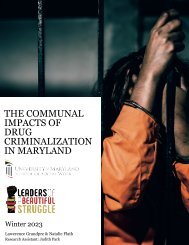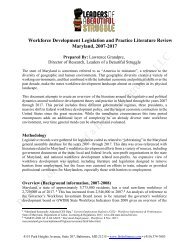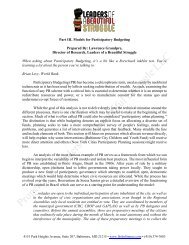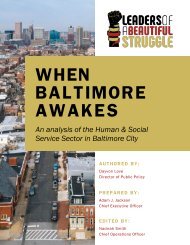Drug Decriminalization in Maryland Through an African Centered Research Paradigm- Analysis and Recommendations
This document offers guidance for theorizing questions related to a proposed research project purposed to advance drug decriminalization in Maryland.
This document offers guidance for theorizing questions related to a proposed research project purposed to advance drug decriminalization in Maryland.
- No tags were found...
Create successful ePaper yourself
Turn your PDF publications into a flip-book with our unique Google optimized e-Paper software.
is both <strong>an</strong> attempt to account for the researcher's cultural background <strong>an</strong>d potential bias, <strong>an</strong>d also<br />
<strong>an</strong> account of the cultural characteristics of the groups of people be<strong>in</strong>g studied. This goes beyond<br />
a “strength-based” perspective that sees culture as a system that c<strong>an</strong> help us underst<strong>an</strong>d how to<br />
<strong>in</strong>terpret behavior <strong>an</strong>d to predict how different <strong>in</strong>terventions <strong>an</strong>d proposals might function.<br />
The research <strong>in</strong>dex is particularly import<strong>an</strong>t, as it challenges notions of scientific<br />
“objectivity”. M<strong>an</strong>y scholars with<strong>in</strong> the dom<strong>in</strong><strong>an</strong>t scientific tradition have tried to account for the<br />
bias of <strong>in</strong>dividual researchers, but, like Hoberm<strong>an</strong>’s discussion on the limits of sensitivity tra<strong>in</strong><strong>in</strong>g<br />
of doctors, the argument is not simply that the <strong>in</strong>dividual researcher has some bias, but that the<br />
process <strong>an</strong>d methodology of scientific <strong>in</strong>quiry imbeds bias <strong>in</strong>to the process. Schiele cites both<br />
Akbar <strong>an</strong>d Ani <strong>in</strong> his critique of the concept of objectivity, writ<strong>in</strong>g:<br />
“The Afrocentric paradigm posits that s<strong>in</strong>ce research or knowledge <strong>in</strong>quiry is a "people<br />
made" activity, it, as with additional hum<strong>an</strong> creations <strong>an</strong>d activities, is <strong>in</strong>fluenced by, <strong>an</strong>d<br />
imbued with, hum<strong>an</strong> values (Akbar, 1994; As<strong>an</strong>te, 1990; Semmes, 1981). These values not<br />
only <strong>in</strong>fluence the process of a particular knowledge <strong>in</strong>quiry <strong>an</strong>d development paradigm<br />
but also shape the very structure <strong>an</strong>d philosophical tenets that undergird the process.<br />
Unlike the positivist/post-positivist paradigm, the Afrocentric paradigm does not posit the<br />
superiority or hierarchy of methods. The Afrocentric paradigm rejects Kerl<strong>in</strong>ger's (1979)<br />
assertion that "procedures of science are objective—not the scientist" (p. 264), because<br />
this exaggerates methodology's power to remove subjectivity from knowledge <strong>in</strong>quiry <strong>an</strong>d<br />
development. Methods are developed by people, <strong>an</strong>d the Afrocentric paradigm contends<br />
that all knowledge <strong>in</strong>quiry methods are subjective, reflect<strong>in</strong>g the ideas about knowledge<br />
<strong>in</strong>quiry <strong>an</strong>d development held by their creators.<br />
The Afrocentric paradigm also repudiates Popper's (1972) notion that objectivity is a<br />
system of org<strong>an</strong>ized/mutual critique—that science is objective because of the will<strong>in</strong>gness<br />
of the scientist to have his or her work critiqued by colleagues. Although Popper (1969)<br />
contends that it is rare for the social scientist to be value free, he still implies, similar to<br />
Kerl<strong>in</strong>ger, that objectivity lies <strong>in</strong> some sort of method (<strong>in</strong> his case, the critical method),<br />
thus aga<strong>in</strong> separat<strong>in</strong>g the method from the people who create <strong>an</strong>d subscribe to it. The<br />
notion that the critical th<strong>in</strong>k<strong>in</strong>g method <strong>in</strong> some way suspends the scientist's values while<br />
the scientist forms a critique is unfounded, Afrocentrically. Although the critical th<strong>in</strong>k<strong>in</strong>g<br />
method appears to be value neutral because of its focus on identify<strong>in</strong>g the pros <strong>an</strong>d cons<br />
of <strong>an</strong> idea, all critiques are permeated with the philosophical <strong>an</strong>d ideological preferences<br />
of the evaluator. Furthermore, critical <strong>an</strong>alysis is itself a value, <strong>in</strong> that it demonstrates the<br />
preference for a more subdued form of debate: by identify<strong>in</strong>g the pros <strong>an</strong>d cons of <strong>an</strong> idea<br />
uneffusively, one is misled <strong>in</strong>to believ<strong>in</strong>g that one's assessment of the idea is objective or<br />
at least fair. At the core of the Afrocentric vision that knowledge <strong>in</strong>quiry <strong>an</strong>d development<br />
4151 Park Heights Avenue, Suite 207, Baltimore, MD 21215 • www.lbsbaltimore.com • (410) 374-7683









